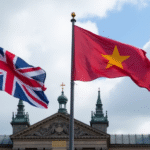Background on the Sinaloa Cartel and its Relevance
The Sinaloa Cartel, one of Mexico’s most notorious drug trafficking organizations, has been designated as a foreign terrorist organization by the U.S. government under President Donald Trump and Secretary of State Marco Rubio. This designation grants U.S. authorities enhanced capabilities to combat the cartel’s activities, including tracking chemical shipments before they enter the country.
The Seizure Details
On Wednesday, the U.S. announced the seizure of 13,000 barrels containing approximately 300,000 kg of chemicals used for methamphetamine production. These shipments originated from China and were destined for the Sinaloa Cartel in Mexico, according to federal authorities.
Jeanine Pirro, the U.S. Attorney for the District of Columbia, and Todd Lyons, the interim Director of U.S. Immigration and Customs Enforcement (ICE), jointly announced the operation in Texas, calling it “the largest seizure of drug-making chemical precursors by the United States.”
Pirro explained that the operation targeted two separate shipments of chemicals transported by different vessels at sea, destined for the Sinaloa Cartel in Mexico. The primary shipping port was Shanghai, China, with the final destination being Mexico.
The seized chemicals, including benzyl alcohol and N-methylformamide, were intended for the production of 189,000 kg of methamphetamine. The estimated street value in Houston for this quantity would be $569 million.
Enhanced Authorities and Ongoing Efforts
With the Sinaloa Cartel’s designation as a foreign terrorist organization, U.S. authorities now have broader powers to monitor and intercept chemical shipments before they reach U.S. borders.
According to Lyons, ICE’s interim director, this designation allows authorities “to track” chemical supplies even before they enter the country. Pirro emphasized that “tonnes of chemicals used to create synthetic drugs like methamphetamine and fentanyl are daily shipped from China to Mexico in an undeclared war against the United States and its citizens.”
Sanctions Against Chinese Companies and Individuals
On Tuesday, the Office of Foreign Assets Control (OFAC) within the U.S. Department of the Treasury sanctioned Guangzhou Tengyue, a Chinese chemical company specializing in the manufacture and sale of synthetic opioids to U.S. customers.
Huang Xiaojun and Huang Zhanpeng, representatives of Guangzhou Tengyue, were also sanctioned for their direct involvement in coordinating the shipment of these chemicals to the United States. Both have been criminally charged by the FBI.
U.S. authorities assert that China-based companies are the primary source of chemical precursors for illicit fentanyl and other opioids entering the United States, contributing significantly to the ongoing opioid crisis.
Key Questions and Answers
- What is the significance of designating the Sinaloa Cartel as a foreign terrorist organization? This designation grants U.S. authorities enhanced capabilities to combat the cartel’s activities, including tracking chemical shipments before they enter the country.
- What chemicals were seized, and how much methamphetamine could they have produced? The seized chemicals included benzyl alcohol and N-methylformamide, which could have been used to produce 189,000 kg of methamphetamine. The estimated street value in Houston for this quantity is $569 million.
- Who were sanctioned by the U.S. Department of the Treasury? Guangzhou Tengyue, a Chinese chemical company specializing in synthetic opioids, along with its representatives Huang Xiaojun and Huang Zhanpeng were sanctioned.
- Why are Chinese companies a concern in the U.S. opioid crisis? China-based companies are identified as the primary source of chemical precursors for illicit fentanyl and other opioids entering the United States, contributing significantly to the ongoing opioid crisis.






